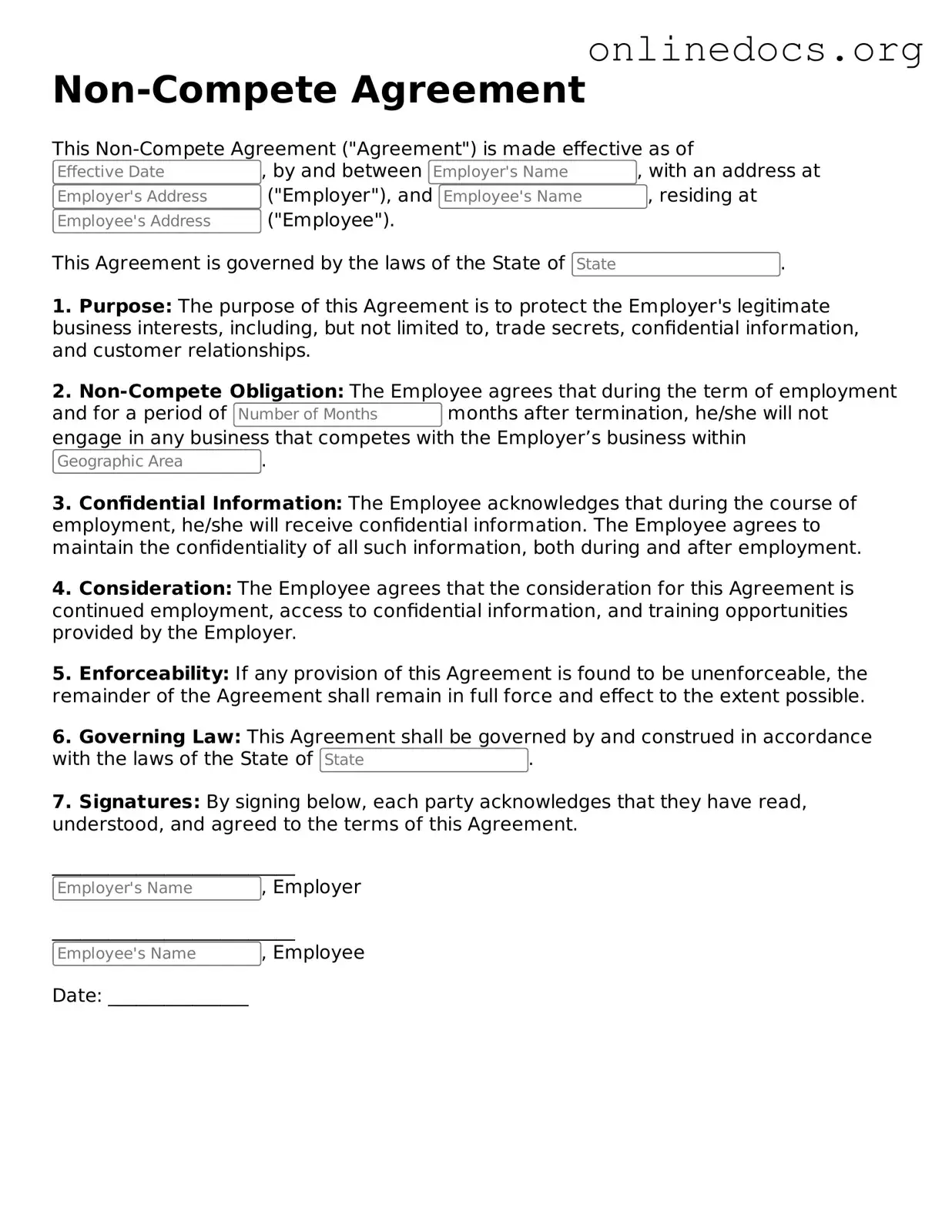A Non-disclosure Agreement (NDA) serves a similar purpose to a Non-compete Agreement by protecting sensitive information. Both documents aim to prevent the sharing of proprietary knowledge or trade secrets. An NDA typically focuses on confidentiality, while a Non-compete Agreement restricts an individual from engaging in competitive activities within a specified timeframe and geographical area. The core principle of safeguarding business interests unites both agreements.
A Non-solicitation Agreement is another document that shares similarities with a Non-compete Agreement. This type of agreement restricts an individual from soliciting clients or employees from a former employer. While a Non-compete Agreement limits a person's ability to work in a competing business, a Non-solicitation Agreement specifically targets the relationships that exist between the employer and its clients or staff. Both agreements aim to protect business relationships and prevent unfair competition.
A Confidentiality Agreement is closely related to a Non-compete Agreement as it also seeks to protect sensitive information. This document ensures that parties involved in a business relationship do not disclose confidential information to unauthorized individuals. While a Non-compete Agreement restricts employment opportunities in competing businesses, a Confidentiality Agreement focuses on the safeguarding of proprietary information, thereby supporting the overall interests of the business.
An Employment Agreement often contains clauses that resemble those found in a Non-compete Agreement. Such clauses may restrict employees from engaging in competitive activities after their employment ends. The Employment Agreement outlines the terms of employment, including responsibilities and expectations, while the Non-compete Agreement specifically addresses post-employment limitations. Both documents are essential in defining the relationship between the employer and employee.
A Partnership Agreement can also bear similarities to a Non-compete Agreement. In partnerships, members may agree not to compete with each other during and after the partnership term. This agreement helps maintain trust and collaboration among partners, ensuring that business interests remain protected. Like a Non-compete Agreement, it outlines specific conditions under which competition is restricted, fostering a cooperative business environment.
A Franchise Agreement may include Non-compete clauses to protect the franchisor's brand and business model. Franchisees often agree not to open competing businesses within a certain radius of the franchised location. This protects the franchisor's investment and ensures that franchisees do not undermine the brand's value. Both agreements work to maintain the integrity of the business and its market position.
An Intellectual Property Assignment Agreement can also be similar to a Non-compete Agreement in terms of protecting business interests. This document assigns ownership of intellectual property created during the course of employment or collaboration. While a Non-compete Agreement restricts future employment in similar fields, an Intellectual Property Assignment Agreement ensures that any innovations or creations remain with the business, safeguarding its competitive edge.
A Release of Liability Agreement may share some characteristics with a Non-compete Agreement in that both documents aim to protect parties from potential risks. While a Non-compete Agreement restricts future employment opportunities, a Release of Liability Agreement protects a business from claims arising from injuries or damages. Both documents serve to limit exposure to risks and liabilities, albeit in different contexts.
Understanding the importance of various legal agreements in business is essential for maintaining a competitive edge and protecting sensitive information. For example, the Employment Verification form plays a critical role in confirming an employee's work status. By utilizing such forms and agreements, companies can ensure compliance with legal standards while also safeguarding their operations. For further details on similar processes, you may refer to legalformspdf.com.
A Service Agreement can contain Non-compete provisions that limit the service provider's ability to work with competing clients. This type of agreement outlines the terms under which services are provided and may include clauses that restrict competition during and after the service period. Both agreements are designed to protect the interests of the business and ensure that confidential information remains secure.
Finally, a Settlement Agreement may include Non-compete clauses as part of the terms for resolving disputes. In such cases, parties may agree not to engage in competitive activities as part of the settlement terms. This helps to ensure that both parties can move forward without the fear of ongoing competition or disputes. Like a Non-compete Agreement, a Settlement Agreement aims to provide clarity and protection for the involved parties.
